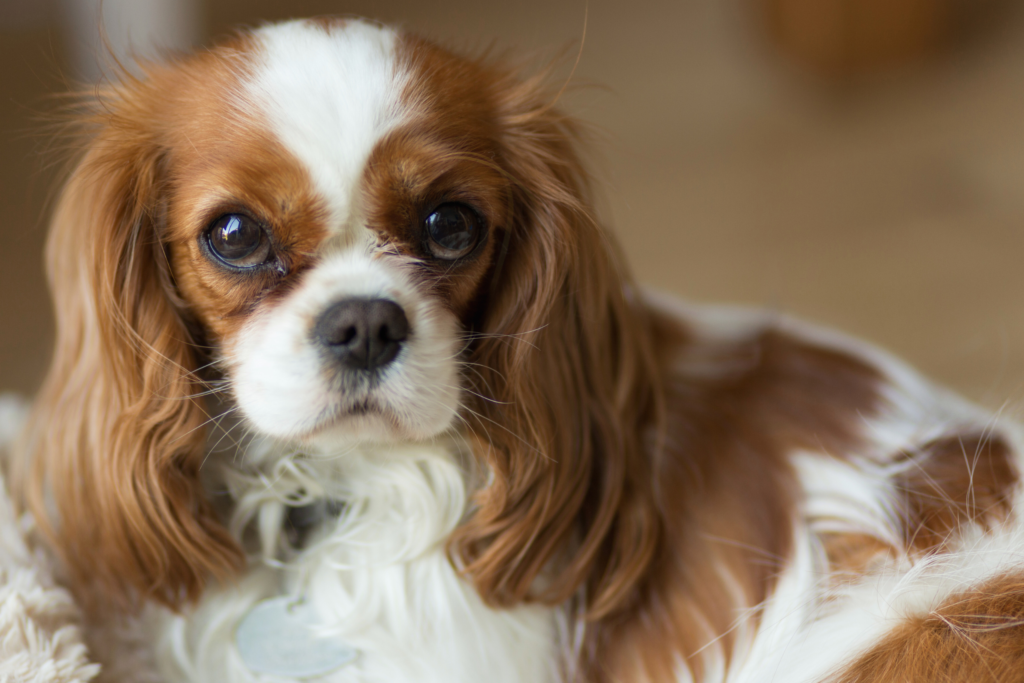Last updated on August 13th, 2024 at 03:39 pm
Cavalier King Charles Spaniel: A Royal Companion

When it comes to combining royal elegance with a heartwarming personality, few dog breeds can match the charm of the Cavalier King Charles Spaniel. These delightful dogs, with their expressive eyes and silky coats, have a storied history that dates back to the courts of Europe. Today, they continue to win the hearts of families and dog enthusiasts around the world. In this article, we’ll dive deep into the fascinating world of the Cavalier King Charles Spaniel, exploring their history, temperament, health, grooming needs, and suitability as family pets. We’ll also share a fun fact and conclude with why this breed might be the perfect addition to your family. Throughout this journey, we’ll reference reliable sources to ensure you get well-rounded and trustworthy information.
Historical Background
The history of the Cavalier King Charles Spaniel is as rich and colorful as the breed itself. These dogs can trace their lineage back to the toy spaniels seen in many Renaissance paintings, where they often appear alongside European royalty. According to the American Kennel Club (AKC), King Charles II of England was particularly fond of these dogs, and they became a staple in the royal court. In fact, it is said that King Charles II issued a decree allowing his beloved spaniels to enter any public space, including Parliament.
However, the breed we know today as the Cavalier King Charles Spaniel had to overcome a period of near extinction. In the early 20th century, breeders focused on developing the shorter-nosed King Charles Spaniel, also known as the English Toy Spaniel. It wasn’t until an American named Roswell Eldridge offered a cash prize at the Crufts Dog Show in the 1920s for anyone who could produce a “Blenheim Spaniel” with a longer nose, similar to those seen in historical portraits, that the breed began to make a comeback. This initiative sparked renewed interest in the breed, leading to the development of the Cavalier King Charles Spaniel we know and love today.
Temperament and Personality
One of the most endearing qualities of the Cavalier King Charles Spaniel is their sweet and affectionate nature. These dogs are known for their friendly and sociable demeanor, making them excellent companions for people of all ages. The AKC describes them as “affectionate, gentle, and graceful,” traits that make them particularly well-suited to families with children or other pets.
Cavalier King Charles Spaniels are often referred to as “comforter dogs” because of their tendency to form strong bonds with their owners. They thrive on human interaction and are at their happiest when involved in the family’s daily activities. This breed is also known for its adaptability; whether you live in a bustling city apartment or a spacious country home, a Cavalier will feel right at home as long as they are with their loved ones.
Their gentle nature and strong desire to please make Cavaliers excellent therapy dogs. Their calm and reassuring presence can bring comfort to those in hospitals, nursing homes, and other care facilities. According to the American Cavalier King Charles Spaniel Club, their temperament makes them ideal candidates for this kind of work, where a friendly and loving disposition is crucial.
Health and Lifespan
Like all dog breeds, Cavalier King Charles Spaniels are susceptible to certain health issues. Being aware of these potential problems can help you provide the best possible care for your furry friend. According to the American Cavalier King Charles Spaniel Club, some of the most common health concerns in the breed include:
- Mitral Valve Disease (MVD): This heart condition is the leading cause of death in Cavaliers. It is characterized by a degeneration of the mitral valve, leading to heart failure. Regular veterinary check-ups and early detection are key to managing this condition.
- Syringomyelia (SM): This neurological condition occurs when fluid-filled cavities develop within the spinal cord. It can cause pain and discomfort, and in severe cases, it can be debilitating. Responsible breeding practices are essential to reduce the incidence of this condition.
- Hip Dysplasia: This genetic disorder affects the hip joints, leading to arthritis and mobility issues. While it is less common in Cavaliers compared to larger breeds, it is still something to be mindful of.
- Eye Conditions: Cavaliers are prone to various eye problems, including cataracts, retinal dysplasia, and dry eye. Regular eye exams can help catch these issues early and prevent serious complications.
Despite these potential health concerns, Cavaliers generally have a lifespan of 12 to 15 years with proper care. Regular veterinary visits, a balanced diet, and a loving home environment are crucial for ensuring a long and healthy life for your Cavalier.
Grooming Needs
One of the many charms of the Cavalier King Charles Spaniel is their beautiful, silky coat. While their luxurious fur might look high-maintenance, their grooming needs are relatively manageable with regular care. According to the AKC, Cavaliers should be brushed several times a week to prevent matting and tangling. Their coats can be prone to collecting dirt and debris, especially if they enjoy outdoor adventures, so regular brushing helps keep them clean and comfortable.
Bathing your Cavalier every few weeks, or as needed, will help keep their coat shiny and free from odors. Use a gentle dog shampoo to avoid skin irritation. In addition to coat care, pay close attention to their ears. The breed’s long, floppy ears can trap moisture and dirt, making them susceptible to infections. Regularly check and clean their ears to prevent problems.
Nail trimming is another important aspect of grooming. Cavaliers’ nails should be trimmed monthly to prevent overgrowth, which can cause discomfort and affect their gait. If you’re unsure about trimming your dog’s nails, your veterinarian or a professional groomer can provide guidance.
Dental care is often overlooked but is crucial for maintaining your Cavalier’s overall health. Regular brushing with dog-specific toothpaste and providing dental chews can help keep their teeth clean and prevent periodontal disease.
Suitability as Family Pets
Cavalier King Charles Spaniels are often described as the ultimate family pets, and it’s easy to see why. Their affectionate nature and adaptability make them well-suited to a variety of living situations, from apartments to large homes with yards. They are known for their gentle and patient demeanor, making them particularly good with children. Whether it’s a game of fetch in the backyard or cuddling on the couch, Cavaliers are happiest when they’re spending time with their families.
One of the standout traits of this breed is their sociability. Cavaliers are naturally friendly and tend to get along well with other dogs and pets. This makes them a great choice for multi-pet households. Their outgoing personality also means they enjoy meeting new people, making them excellent companions for social outings and gatherings.
Training a Cavalier King Charles Spaniel is usually a positive experience due to their eagerness to please and their intelligent nature. They respond well to positive reinforcement techniques, such as treats, praise, and play. According to the Cavalier King Charles Spaniel Club of America, early socialization and training are important to ensure they grow into well-rounded adults.
FUN FACT
Did you know that Cavalier King Charles Spaniels are often called “shadow dogs” because of their tendency to follow their owners everywhere? These affectionate little companions love being close to their humans and will often stick by their side, whether they’re relaxing at home or going on a walk. Their loyal and devoted nature makes them a wonderful addition to any family, always ready to offer comfort and companionship.
Conclusion
The Cavalier King Charles Spaniel is a breed that truly stands out with its royal heritage, affectionate temperament, and suitability as a family pet. Their gentle and loving nature, combined with their charming appearance, makes them an ideal choice for dog lovers seeking a loyal and adaptable companion. With proper care, attention to health, and regular grooming, these dogs can bring joy and companionship to any home. Their historical significance and enduring popularity are testaments to their unique appeal. If you’re considering adding a Cavalier King Charles Spaniel to your family, you can look forward to years of love and devotion from this remarkable breed.

Good web site yyou have got here.. It’s difficult to find good quality writing like yours these days.
I honestly appreciate people like you! Take care!!